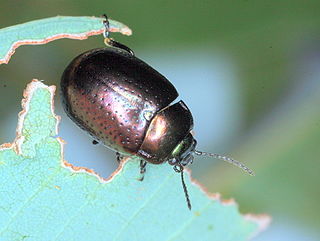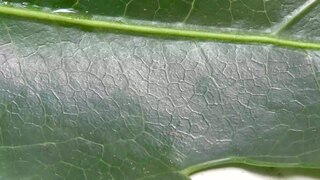The World Register of Marine Species (WoRMS) is a taxonomic database that aims to provide an authoritative and comprehensive list of names of marine organisms.

Chrysolina quadrigemina is a beetle of the family Chrysomelidae.

The Harpactorinae are a large subfamily of the Reduviidae. About 300 genera and 2,000 species worldwide have been described. Some of the species of the genera Zelus, Pselliopus, Sinea, and Apiomerus are of interest as biological pest control agents.

Harpactor is a genus of assassin bug family (Reduviidae), in the subfamily Harpactorinae.

Pyrgomorphidae is a family of grasshoppers in the order Orthoptera; it is the only family in the superfamily Pyrgomorphoidea, with a pan-tropical distribution. Their name is probably derived from pyrgos meaning "tower": a reference to the form (morph) of the head in the type genus Pyrgomorpha and other genera.

The genus Helopeltis, also known as mosquito bugs, is a group of Heteropterans in the family Miridae and tribe Dicyphini. They include important pests of various crops, including cacao, cashew, cotton and tea. Now in a different subgenus, a number of similar Afropeltis species are pests in Africa.

Dicyphini is a tribe of bugs in the family Miridae.
The bicolored swamp snake also known as the striped swamp snake is a species of African venomous snake. It is the type species of the genus Limnophis. Their backs are black with a white underbelly.

Tachyporus is a genus of rove beetle in the tribe Tachyporini. It is the type genus of both the tribe Tachyporini and the subfamily Tachyporinae.
Chamus is a genus of Miridae or capsid bugs in the tribe Dicyphini and subtribe Odoniellina. Species can be found in in central and southern Africa, with the type C. wealei first described by Distant in 1904.
Ammianus is a genus of lace bugs in the family Tingidae. There are at least 40 described species in Ammianus.
Diocalandra frumenti, commonly known as the palm weevil borer, the lesser coconut weevil, or four-spotted coconut weevil, is a species of weevil in the family Curculionidae. It occurs in Africa, Southern Asia and Northern Australia, and is a pest of coconut and other palm trees.
Amulius is a genus of Asian bugs in the family Reduviidae. It has been placed in the tribe Ectinoderini: the 'Oriental resin bugs'.

Nephotettix is a genus of planthoppers in the subfamily Deltocephalinae and tribe Chiasmini. Species are mostly found in Asia, although two are from Africa.

Dulichius is a genus of bugs in the family Alydidae and tribe Micrelytrini. It is notable for species which are ant mimics.

Monalonion is a genus of bugs in the family Miridae and tribe Dicyphini.

Pammene rhediella is a moth belonging to the family Tortricidae. The species was first described by Carl Alexander Clerck in 1759.
Scotinophara is a genus of shield bugs in the tribe Podopini. At least 63 species have a widespread distribution in Europe, Africa, Asia and Australia.
Distantiella is a genus of African bugs, of the family Miridae or "capsids"; this genus is placed in the subtribe Odoniellina: which has been included in tribes Dicyphini or Monaloniini.









